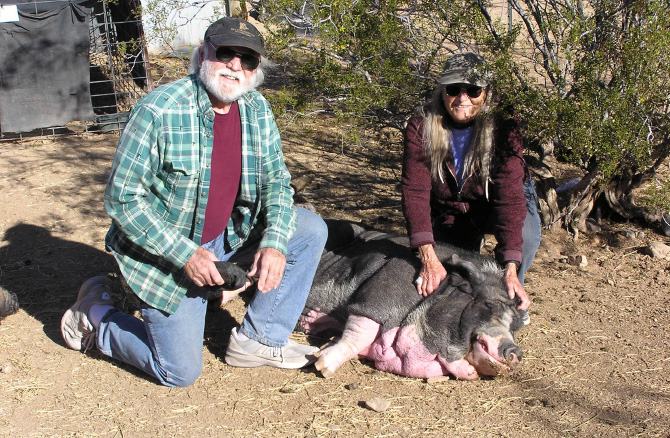
By Michael LaChance
There’s pot-bellied pigs a-plenty at this sanctuary in Arizona that’s dedicated to helping the little grunters live a safe, happy, and healthy life.
On the outskirts of Tucson, Arizona, a sprawling stretch of land is home to a bevy of pigs, and the people who are helping them to live their best lives. The Ironwood Pig Sanctuary is located in Marana, and with over 600 pot-bellied pigs, they’re one of the largest pot-bellied pig sanctuaries in the U.S.
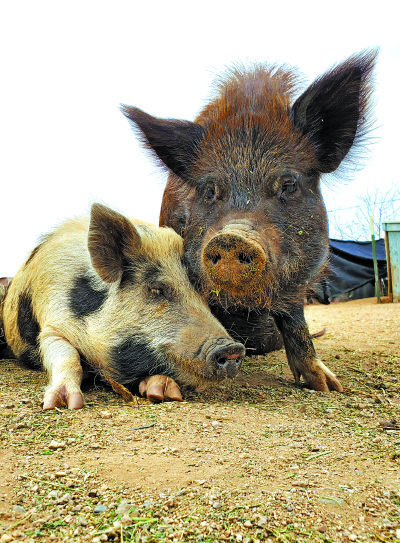
THE PLIGHT OF THE POT-BELLIED PIG
There’s nothing out of the ordinary about animal sanctuaries, but why did cofounders Mary Schanz and Ben Watkins decide to open this particular space? In the late ’90s, Mary saw an article in the local Tucson newspaper about a woman with a growing number of rescued pigs, in desperate need of help to care for them. Since she was active in the animal rights movement at the time and growing angrier about the way animals were being treated, it wasn’t long before she sprang into action.
She tells PET LIFESTYLES, “My husband Ben and I decided we would try to help her. I felt this was an area I could actually make a difference. Ben was a retired engineer and I am a retired Medical Technologist with a love of animals. We got hooked on the pigs. We could see she was being overwhelmed and did not have the means to care for all of them, so in the fall of 2000, we purchased land to begin to build our own pot- belly pig sanctuary.”
Things took off pretty quickly from there. Ben designed the facility and by June of 2001, they were beginning to welcome their first pigs. “In the beginning, we invested our own money to get the shelter up and running. Today we are totally funded by donations from our newsletter and sponsor program, a few grants, and a few bequests,” Mary says. 2,000 pigs have been saved at Ironwood over the years, currently there are about 625 pigs in the sanctuary, and several scattered across different foster homes. That’s a lot of pigs! Luckily, the sanctuary is on 27 acres of land, and they own another 100 acres as a buffer.
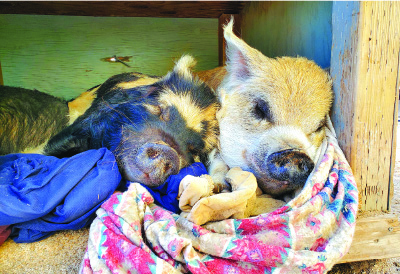
POCKET-SIZED PIGLETS
If you’re curious about why Ironwood Pig Sanctuary focuses on the pot-bellied pig, here’s a little information from Mary that may help you out. She explains that not only is the situation for these pigs pretty dire in the United States at the moment, it’s mostly the fault of a popular late ’90s fad: the teacup pig. It’s tempting to fall into the teacup pig trap — who doesn’t want a pocket-sized piglet running around the room? Since most pigs grow to be too big to keep indoors, the teacup trend was perfect for anyone who wanted a piglet but didn’t have the room to keep a full-sized pig. Unfortunately, as Mary explains, this ‘mini pig’ promise, which several breeders continue to propagate today, has always been a lie.
“There are probably hundreds of thousands if not millions of homeless pigs now because of overbreeding — and they have no safety net. Most animal control facilities and Humane Societies don’t take them, or pass them on to overcrowded rescues,” Mary tells PET LIFESTYLES. She also adds that pigs are prey animals, and breed at a very young age — males can be fertile as young as 60 days and females at 12 to 16 weeks. They need care, but there are few vets equipped or willing to take this on. And, since they’re ‘exotic’ pets, if you do find a vet willing to care for your pig, it’s most likely going to be too expensive for you to afford.
Pigs aren’t always seen as domestic animals, and they may not be allowed to live everywhere. So, all those thousands of dollars you’re spending will be for naught if zoning laws don’t even allow you to keep them. “Ben and I have picked up hundreds of pigs over the years and 90% or so live in awful situations. The once adorable and loved pig, is now outside confined to some tiny pen with no enrichment and truly little or no attention. They are herd animals and really need the company of each other and most people only want one,” Mary adds. It doesn’t help that people don’t know what they’re getting into when they buy them, leading to too many abandoned pigs.
If you must have a pig, Mary says instead of buying, “Adopt and do your homework, don’t buy them from breeder web sites.” At Ironwood Pig Sanctuary, not only are these poor pigs given a home, care, and any medical attention they need, you also have the option to visit and volunteer if you love pigs enough to want to spend time around them. You can also make a tax-free donation, sponsor a pig or add the sanctuary to your will to help them out financially.
RESCUE STORIES
Mary shares some rescue stories to lift our spirits and explain in detail how the sanctuary helps rescue pigs in need.
Marsha & Mallow
In February this year, the folks at Ironwood rushed to Coolidge, AZ to pick up a mom and her baby girl who were strays and had wandered onto a lady’s pasture. “The mom was attacked by a horse living there who was kicking and biting her. They were picked up and taken directly to the vet clinic where the mom was treated, she is thin, neglected, pregnant and now suffering from her wounds. But she and her baby are together in a warm shelter with plenty of pain meds for Mom and good food to eat every day.
Baby Face
“Baby Face arrived with her foster parents in Maricopa, AZ in a pretty dramatic way,” Mary tells PET LIFESTYLES. Her foster parent Grace got a call about a stray pig running loose at a construction site. “It happened to be on a scorching 112-degree day. In an unfinished house with no walls, it took putting plywood around one room to secure her. Thankfully, the water was on and we were able to cool her off and eventually load into a truck to take her to safety.”
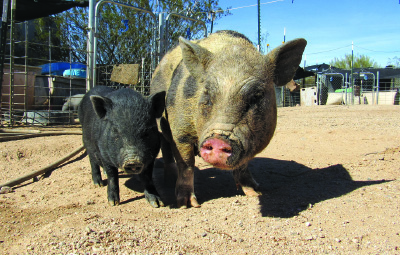
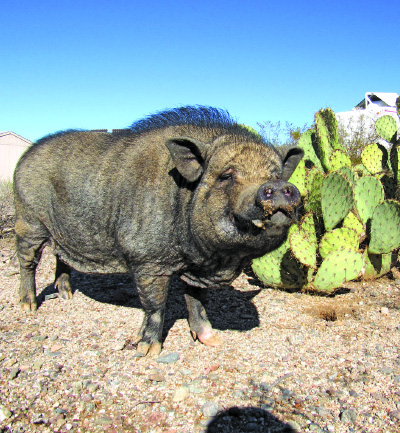
Baby Face made herself right at home in a pen next to pigs Oprah and Bojangles, but her struggle was not over yet. Six months later, she started to itch, allergies or environmental toxins were suspected. When medications did not work, they brought her to Ironwood. What made the difference? A lucky guess: Taking her off corn and wheat. That was not an easy task for a pig, since all pig food contains corn. Potatoes, cooked lentils, quinoa, beans, fruits, veggies, and eggs became her diet and now she’s greatly improved. In nearly 20 years of running the sanctuary, this is the first time pig food allergies have presented themselves. Thankfully, Ironwood’s team found a solution.
To find out more, volunteer or donate to Ironwood Pig Sanctuary, visit ironwoodpigs.org














